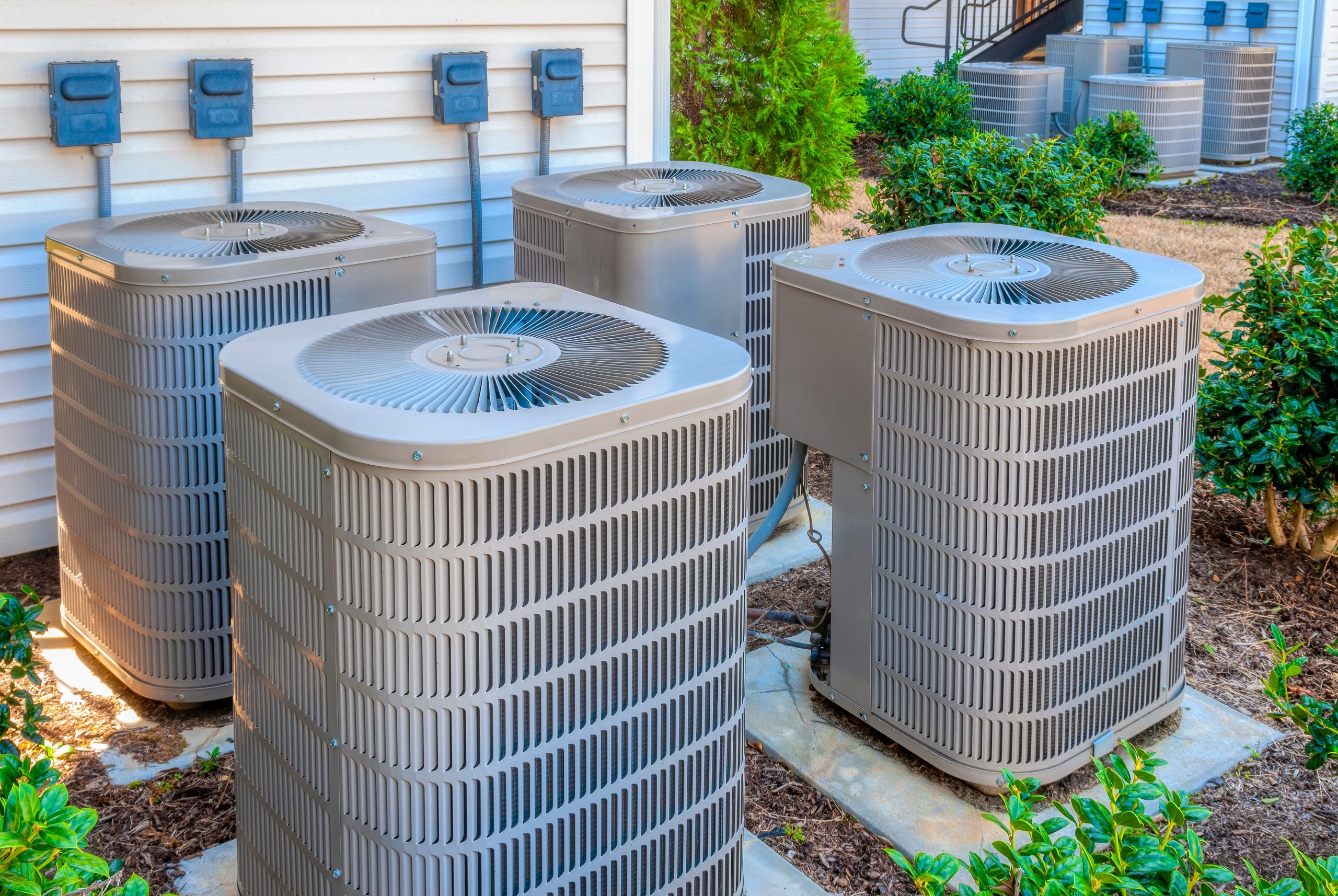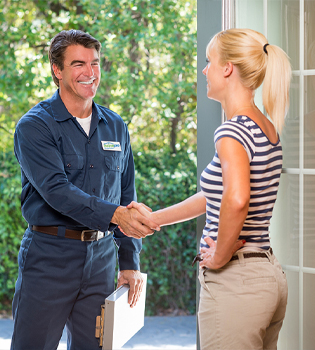
Inefficiencies in the HVAC unit can significantly affect your heating and cooling bills and reduce the air conditioning and heating performance of the HVAC. Even energy star-rated models of HVAC can become less efficient over time if regular maintenance is neglected, or if any required furnace maintenance or AC maintenance is not done on time.
It can be challenging to identify issues with the HVAC that is not allowing it to perform at its maximum HVAC efficiency; however, if you have the right knowledge, you can find the solution. Here are ten tips to improve the energy efficiency ratio of your HVAC unit.
1. Replace Damaged Components
Generally, an A/C unit can last around ten years. To maximize its life, you want to get it serviced twice a year, once before winter and again before the hot summer months. There can be issues with the HVAC components that cannot be repaired, or it is not cost-efficient to repair them. In that case, you can consider replacing the damaged components. A common reason for the HVAC to become inefficient is a broken thermostat. You can consider installing a programmable thermostat that will automate temperate control based on your settings.
If your A/C is blowing hot air, it can be a result of faulty components. You can get the HVAC system examined by a professional to determine if a replacement service is needed to maximize the HVAC’s energy efficiency. Hiring an experienced professional for HVAC services can help you identify if any components need replacement to fix the hot air flow from the A/C.
2. Add Insulation and Seal Leaks
If you are concerned about your HVAC’s energy use, consider adding insulation. It is worth checking the A/C ducts for any signs of leaks. During the day, your attic absorbs all the heat, which makes the temperature around the house warmer.
Improper attic insulation could let the warm or cold air escape from your house, which impacts the interior temperature. The placement and size of the attic affect the temperature of your entire house, and any leaks in the attic could result in high energy costs due to the inefficient performance of the HVAC system.
Adding extra insulation and sealing all leaks help make the HVAC energy efficient.. An expert HVAC professional can perform an energy audit of your house to check if insulation could be useful for your HVAC’s efficiency.
3. Ensure the Air Flow Is Not Obstructed
If the air ducts are obstructed by furniture or any other obstacles, it might reduce the HVAC energy efficiency, as it might not get proper airflow. You can get the system design reviewed to determine if there are any internal or external airflow obstructions.
Using a vacuum cleaner in front of the supply and return vents can ensure no debris accumulates and obstructs the airflow. If there are any plants or other objects placed in front of the air ducts, removing them can restore proper airflow. If the vents or ducts are blocked by furniture or any other object, the HVAC system will work harder to pull air and ensure maximum airflow.
4. Get Regular HVAC Tune-Ups
Regular HVAC system tune-ups can provide you with the peace of mind of knowing that the unit is working at its maximum HVAC energy efficiency. It can also help avoid costly HVAC repairs in the future.
However, there are a few things system tune-ups do not include. For instance, defective condenser coils are not cleaned or repaired in the tune-up. The HVAC professional would not clear the drain lines for you during the tune-up, and air filters will not be replaced during inspections or tune-ups.
Ideally, you want to get the HVAC system tune-up or inspection performed a couple of times every year. The HVAC professional will inform you on what needs to be done to make the HVAC system more energy efficient, but any repair and replacement is typically not part of the tune-up service. The typical HVAC inspection includes:
- Lubrication of all moving parts of the AC system to reduce friction.
- Inspection of the condenser, evaporator, blower motor, heat pump, and other components of the HVAC.
- Inspection of airflow through the vents and temperature control.
- Checking the refrigerant level/pressure.

5. Install Ceiling Fans
If the AC system is not distributing cool air properly in the room, you can reinforce circulation by installing ceiling fans to reduce cooling load and help boost A/C efficiency. With the increased circulation, there will be a notable increase in efficiency because the air conditioning system would not be working as much to reach temperature requirements. This can also decrease your energy costs.
The blades of the ceiling fan should rotate counterclockwise to ensure all the air is directed downwards to keep your home cool. You should also ensure the ceiling fan is not set at such high speeds as it is restricting the airflow from the vents.
6. Change HVAC Placement
Another way to boost the A/C energy efficiency is to place the outdoor condenser unit in the shade. This can allow the external unit to remain cooler and minimize the heat from direct sun exposure. Keeping the condensing unit in a shaded area would prevent it from working at a higher rate during the summer. This will boost HVAC energy efficiency and reduce utility bills.
If you want to boost the efficiency of the external unit, you can shield it with an object to prevent it from getting direct heat from the sun. This will help prevent the HVAC from using more energy than it should.
Another thing you can do is plant trees around the external unit. It is possible to note as much as a ten percent decrease in energy consumption when the external unit is shaded or placed in a relatively cooler environment than directly under the sun. If your house has more than one condenser unit, try not to have the condenser units too close to each other, as that can reduce efficiency.
7. Add UV Lights to the Evaporator Coil
People are often not aware that neglecting the maintenance of the evaporator coil in the HVAC could lead to expensive repairs or replacement services for the HVAC. In some cases, they might need to replace the entire HVAC unit. You can hire a professional to service the evaporator coil, such as by adding UV lamps to the coil, which could increase the efficiency of the entire HVAC unit.
Typically an evaporator coil can malfunction if there is mold growth in it. Getting a UV lamp installed inside the evaporator coil of the AC unit can kill any type of growth in the coil. There can also be dust accumulated in the coil, which a service provider can remove using a brush.
It is a common misconception that frozen condenser coils are the reason behind the lack of cold air from the air conditioner. Condenser coils cannot freeze; only dirty evaporator coils inside the HVAC system freeze and become incapable of cooling the air.
Defective evaporator coils can also cause leaks in the AC system. Refrigerant leaks or a frozen evaporator coil can further damage the compressor within the system. Get the evaporator coil serviced to ensure that the HVAC system remains free of damage and operates at maximum efficiency.
8. Replace Filters
The air filter of the HVAC is designed to improve indoor air quality by removing most of the contaminants from the air. Most people think cleaning air filters in the HVAC system will extend its lifespan; however that is not true as an air filter is not cleaned, it is replaced.
When the HVAC system is continuously functioning, the filters can become clogged and become defective, leading to HVAC energy efficiency problems. You should stick to using a genuine OEM air filter as aftermarket filters are likely to underperform or not be compatible with your unit. A clean filter will also help lower energy costs.
9. Cleaning Condenser Coils
Getting the condenser coils cleaned will make your HVAC system remain energy efficient and increase its lifespan. A functional condenser coil will reduce the likelihood of needing repairs. Condenser units are located outside of the house and compress the refrigerant gas. The coils inside the condenser unit gather and expel warm air from inside the house. These coils can get clogged due to air contaminants such as dirt, leaves, etc.
Cleaning the condenser coils can ensure that the system does not cycle frequently to reach temperature requirements. Regularly cleaning the condenser coils can reduce the wear on the HVAC system, making it work more efficiently. It is important to get the condenser coils serviced to ensure the maximum flow of cooled air. Keeping the condenser coils clean will also help mininmize the need for AC repair.
10. Clean the Drain Lines
The moisture present in the air is accumulated by the condensation pan in the HVAC unit and is further expelled through the drain pipes outside the house. However, the condensation accumulated in the system not only comprises liquid but may also contain some bacteria and large debris or dust contaminants. This can clog the drain lines, making the HVAC less energy efficient and increasing energy bills.
Keep in mind that cleaning the drain lines yourself using home remedies might degrade the materials in the HVAC system. It is best to hire a service technician to clean the drain lines, restore the flow of condensation, and have the HVAC running properly.
You are welcome to contact us at House Pro for professional HVAC services including AC repair and furnace repair. Our House Pro technicians can do an comprehensive inspection service for your HVAC unit to guide you on what services are needed to maintain to restore its efficiency.

